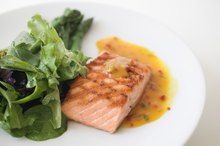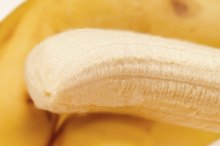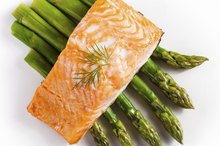What does fact checked mean?
At Healthfully, we strive to deliver objective content that is accurate and up-to-date. Our team periodically reviews articles in order to ensure content quality. The sources cited below consist of evidence from peer-reviewed journals, prominent medical organizations, academic associations, and government data.
The information contained on this site is for informational purposes only, and should not be used as a substitute for the advice of a professional health care provider. Please check with the appropriate physician regarding health questions and concerns. Although we strive to deliver accurate and up-to-date information, no guarantee to that effect is made.
Potassium-Reduced Diet
Many of the foods that provide essential nutrients also contain the mineral potassium. If you have kidney disease, limiting high-potassium foods is recommended, but eating small amounts of low-potassium foods can help you consume adequate vitamins and minerals. Choosing low-potassium foods -- which contain less than 200 milligrams per serving -- from the major food groups will ensure you get adequate micronutrients and keep your body's potassium levels under control. Eating extra servings of any low-potassium food may provide more of the mineral than your diet plan allows. Always follow the advice of your doctor and dietitian regarding your renal diet.
Fruits and Vegetables
Some fruits and vegetables contain even less potassium, with 50 to 120 milligrams per 1-cup serving. These include: romaine lettuce, blueberries, peppers, kale and Brussels sprouts. One-half cup of cooked cauliflower or green beans also contains less than 120 milligrams of potassium per serving.
Dairy Products
Potassium Levels in Meat
Learn More
Foods like milk, cheese and yogurt provide essential nutrients such as calcium and vitamin D. All dairy foods contain potassium, but some are lower than others. With less than 200 milligrams of potassium, 1 cup of nonfat cottage cheese, 5 ounces of Greek yogurt or 1/2 cup of ice cream are options lower potassium options. Many varieties of shredded cheese contain less than 150 milligrams of potassium per 1-ounce serving. These include: muenster, nonfat mozzarella, reduced-fat cheddar, feta and whole-milk mozzarella.
- Foods like milk, cheese and yogurt provide essential nutrients such as calcium and vitamin D. All dairy foods contain potassium, but some are lower than others.
- Many varieties of shredded cheese contain less than 150 milligrams of potassium per 1-ounce serving.
Lower Potassium Grains
Virtually all foods in this food group contain some potassium, with the exception of saltine crackers. Grain foods with less than 100 milligrams of potassium include: a packet of instant oatmeal, 1 cup of couscous, 1 cup of brown or white rice, enriched or whole-wheat pastas, and hot cereals prepared with water.include:
- Grain foods with less than 100 milligrams of potassium include: a packet of instant oatmeal
- 1 cup of couscous
- 1 cup of brown or white rice
- enriched or whole-wheat pastas,
- hot cereals prepared with water
Ready-to-eat cereals vary widely, so check the nutrition facts panel for the total potassium per serving. Low-potassium whole grains include: one whole-wheat tortilla with 107 milligrams, whole-wheat crackers with 97 milligrams per ounce or whole-wheat bread with 92 milligrams of potassium per ounce.
Lower Potassium Meats
Eating Too Much Potassium
Learn More
All meats contain some potassium, many at high levels. For meat, 3 ounces is a standard portion size. Lean meat is the healthiest choice as it contains less saturated fat, but a standard portion of pork loin provides 482 milligrams of potassium; the same serving of salmon provides 429 milligrams of potassium. Beef and boneless chicken breast are not much better choices -- a 3-ounce portion of beef round has 411 milligrams, and chicken breast has slightly less potassium with 357 milligrams per serving.
- All meats contain some potassium, many at high levels.
- Lean meat is the healthiest choice as it contains less saturated fat, but a standard portion of pork loin provides 482 milligrams of potassium; the same serving of salmon provides 429 milligrams of potassium.
Nuts and Beans
A few nuts and seeds meet the low-potassium guidelines, but none are potassium-free. One ounce of almonds, cashews and mixed nuts with peanuts will all provide less than 200 milligrams of potassium per serving. Beans and legumes also have some options, but still contain potassium. Low-potassium choices include many soy-based meat substitutes and 2 tablespoons of peanut butter.
- A few nuts and seeds meet the low-potassium guidelines, but none are potassium-free.
- One ounce of almonds, cashews and mixed nuts with peanuts will all provide less than 200 milligrams of potassium per serving.
Related Articles
References
- Davita Healthcare Partners: 30 Healthy Low Potassium Farmer’s Market Food Finds for Kidney Diets
- USDA National Nutrient Database: Potassium Fruits and Fruit Juices and Vegetables and Vegetable Products
- USDA ChooseMyPlate.gov: Fruits and Vegetables Health Benefits and Nutrients
- USDA National Nutrient Database: Potassium Dairy and Egg Products
- USDA National Nutrient Database: Potassium Breakfast Cereals, Cereal Grains and Pasta
- USDA National Nutrient Database: Potassium Baked Products
- USDA National Nutrient Database: Potassium Beef, Finfish and Shellfish, Pork Products, Poultry Products
- USDA National Nutrient Database: Potassium Nuts and Seed products
- USDA National Nutrient Database: Potassium Legume and Legume Products
- Arnold R, Pianta TJ, Pussell BA, et al. Randomized, Controlled Trial of the Effect of Dietary Potassium Restriction on Nerve Function in CKD. Clinical Journal of the American Society of Nephrology. 2017;12(10):1569-1577. doi:10.2215/cjn.00670117
- A to Z Health Guide. Potassium and Your CKD Diet. National Kidney Foundation. Published November 2, 2018.
- National Institutes of Health Office of Dietary Supplements - Potassium. Nih.gov. Published 2017.
- Raebel MA. Hyperkalemia Associated with Use of Angiotensin-Converting Enzyme Inhibitors and Angiotensin Receptor Blockers. Cardiovascular Therapeutics. 2011;30(3):e156-e166. doi:10.1111/j.1755-5922.2010.00258.x
- St-Jules DE, Goldfarb DS, Sevick MA. Nutrient Non-equivalence: Does Restricting High-Potassium Plant Foods Help to Prevent Hyperkalemia in Hemodialysis Patients? Journal of Renal Nutrition. 2016;26(5):282-287. doi:10.1053/j.jrn.2016.02.005
Writer Bio
Lindsay Stern is a registered dietitian and licensed nutritionist who has been working in community and clinical nutrition since 2006. Currently she specializes in wellness and prevention and has been a certified Health and Wellness Coach since 2012. Stern holds Master of Public Health nutrition from the University of Minnesota.









